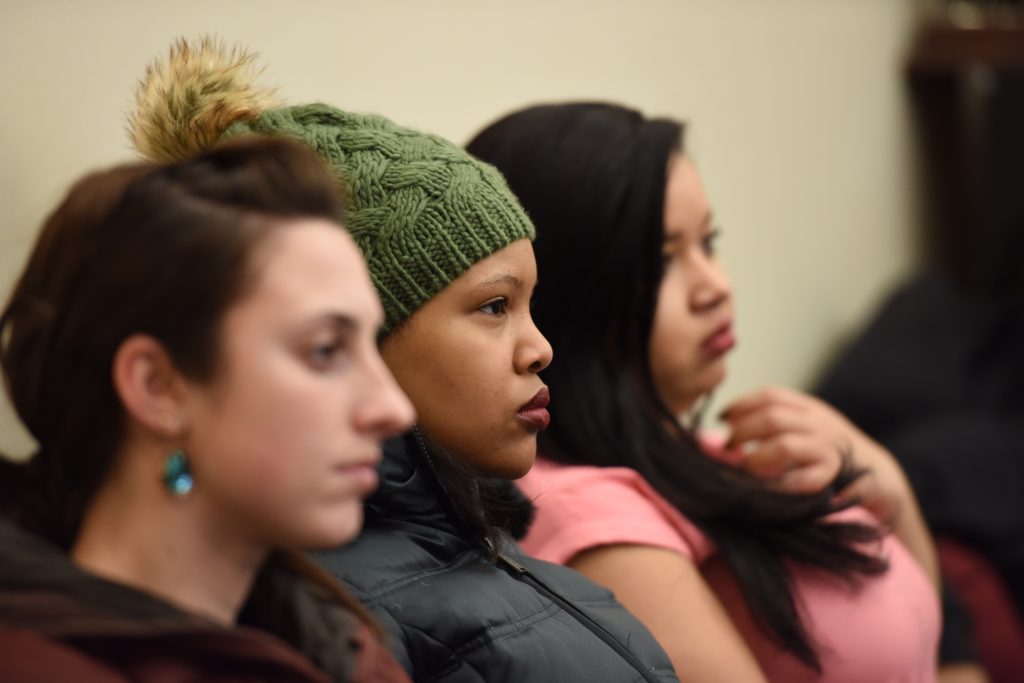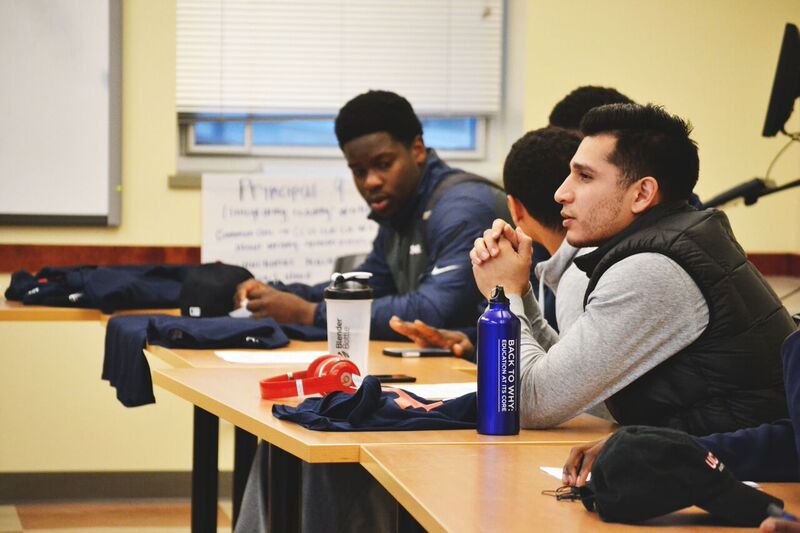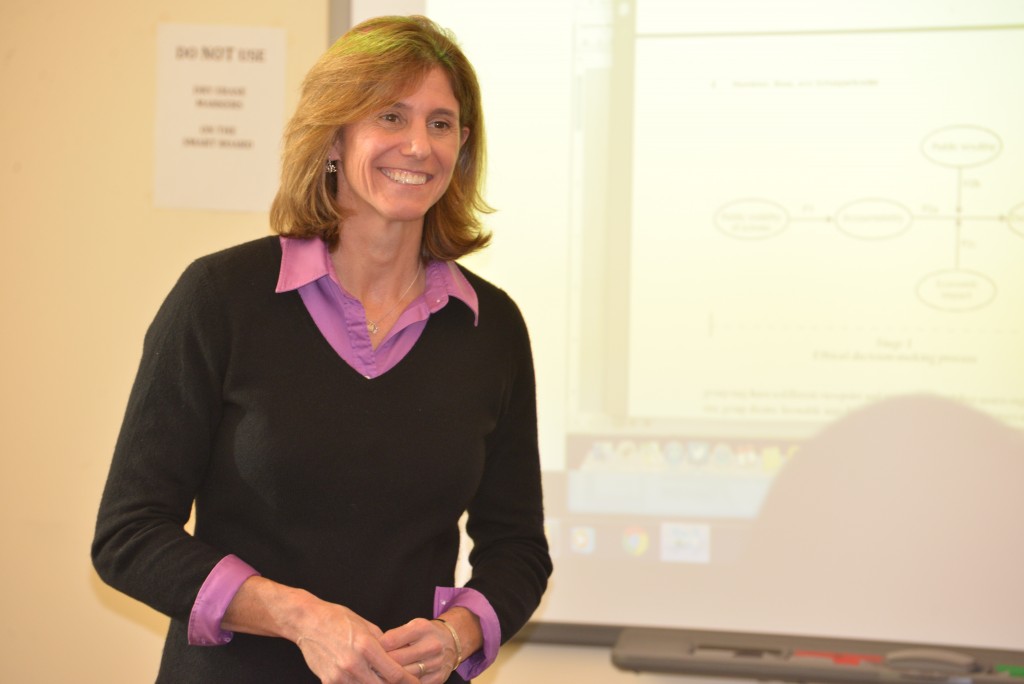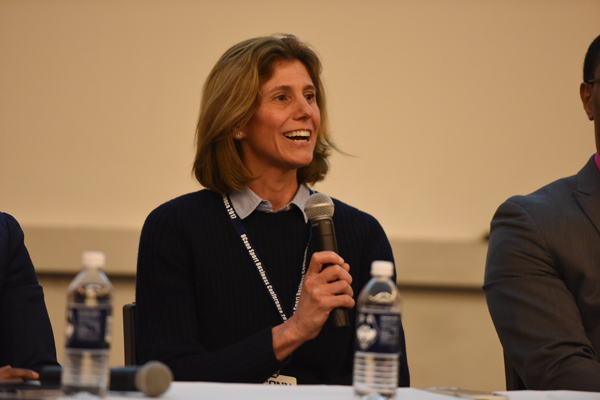New Haven Register, EDLR’s Sarah Woulfin served as consultant on Blue Ribbon Reading Commission
Our Faculty
‘City That Reads’ Looks for Outside Cash
New Haven Independent, Alum Kelvin Roldán ’15 6th Year and assistant professor Sarah Woulfin served on panel as consultants
Charter Schools Accuse San Jose School District of Trying to Poach Teachers
San Jose Inside, EDLR’s Preston Green comments on charter school problems in California
Experts Discuss Controversial Court Ruling About Students With Severe Disabilities
WNPR, EDLR’s Robert Villanova quoted during a special education summit about issues and solutions around CCJEF v. Rell
New Study Highlights High Quality Career and Technical Education
MassBudget, A new research report by EDLR’s Shaun Dougherty was covered
Superintendent of Hartford Public Schools Visits EDLR Students
“Leaders must be close enough to relate to others, but far enough ahead to motivate them.”- John C. Maxwell
On April 24, 2017 students in Professor Joshua Hyman’s class, EDLR 6322: Economics of Education Reform were able to learn about and discuss the characteristics of this kind of servant leadership in education from the first hand account of Superintendent of Hartford Public Sc hools, Dr. Leslie Torres-Rodriguez, who was recently appointed after having served as interim superintendent since December 9, 2016, and her leadership abilities embody this quote.
hools, Dr. Leslie Torres-Rodriguez, who was recently appointed after having served as interim superintendent since December 9, 2016, and her leadership abilities embody this quote.
Torres-Rodriguez was an ELL, English Language Learner, student in Hartford Public Schools and having worked in the Greater Hartford Area for the past 22 years, has a strong connection with the community. Student Michael Corral commented, “She is invested in the city of Hartford, and is not trying to use it as a stepping stone to some other position or district.” The Superintendent herself expressed how important the success of the Hartford school district is to her personally, and not just as a job. She understands the families and students as she once felt she was a “disenfranchised” student of the school district, and now strives to be an agent for positive change and open ear for the concerns of the community.
Dr. Torres-Rodriguez maintains her relations with her constituents by being transparent, honest, accountable, and using feedback to focus on how policy and school leadership can improve. With an increasing number of ELL students and 20% of students being special education; she is mindful that change for the district is moving towards a more diverse population, and therefore requires policy to accommodate student needs. The superintendent brings an important humanistic element and strong academic qualifications into the field with her background in Human Development (B.S, University of Connecticut), Social Work (M.S., University of Connecticut), and Educational Leadership (Ed.D Central Connecticut State University). She believes that her less traditional path has furthered her skills as a leader in education as she brings an anthropological background to her passion for education.
During her visit, the superintendent gave insight into many of the challenges of her position as well as how she is managing these new challenges. Students in Professor Hyman’s class benefited from this discussion, as they were able to listen to her first hand experiences and see a glimpse of how a large local school district superintendent operates.
Student, Sarah Redlich, commented,
“I found her discussion of the different stakeholders she works with and how she considers the implications of decisions for the operation of the Hartford school system to be very interesting. The perspectives Dr. Leslie Torres-Rodriguez shared helped me explore the important decisions and considerations that are involved with being a school leader.”
This comes from a discussion about the multifaceted nature of being a superintendent. Dr. Torres-Rodriguez, does not just service Hartford Public schools, but she is in charge of overseeing the placement of Hartford students in other districts, a transition that Hartford funds, as well as some oversight over the cities’ magnet and charter schools. Because of this she must have strong community ties and an eye for good policy. She enlightened the class on managing funding, ensuring good relations with these other schools, and how to insure the academic and emotional well-being for a diverse population of students in the cities’ schools. Student. Michael Corral, particularly benefited from her discussion about the complexities of acquiring funding and developing a budget as he noted, 
“It was nice to listen about the application of funding models and how they are formulated with the best of intentions but can - at times - perpetuate many of the injustices they are supposed to address.”
It is key to note that the formula for a successful school district is not always easy, but Dr. Torres-Rodriguez shed light on how to weigh issues, remain transparent, and work with other stakeholders to develop good policy, and leave it adaptable as the nature of education is not static.
The class was highly engaged as they asked Dr. Torres-Rodriguez questions about her approach towards fiscal policy, diversifying student needs, maintaining enrollment in schools while respecting parent-school choice, and interacting with key stakeholders, such as the board, school leadership and her constituents. After these in-depth questions about her experience, student, Daron Cyr, asked a very important question, ‘How does she do it all?’
Dr. Torres-Rodriguez said that it was a combination of self-care, having a network of other educational leaders, who see things from the same systemic viewpoints, and her drive to help Hartford schools and students succeed. She emphasized her passion by saying, “If there was a hill I would die on, it would be this.” Meaning she is ready to do everything she can to work for this community. As a product of the system, and as someone, who has worked in Hartford for a long time she admits she has seen the city’s failures, but she also sees great potential, and this is what she is working towards.
This was a high-energy and inspiring conversation that the students actively benefited from. It brought life to the issues and policies the Ph.D students have learned about in professor Hyman’s class, and throughout their education. Professor Hyman commented on this experience,
“While my hope is that my students learn a lot about education policy from the course readings, discussion, and lecture, there is really no substitute for engaging with and learning from a long-time teacher and district administrator serving in disadvantaged communities.”
The Department of Educational Leadership extends a warm thank you to Dr. Torres-Rodriguez for providing insight into the inner workings of developing a budget, editing and adding policies all while maintaining a relationship with the community. This type of hands on experience offers our students an opportunity to engage with a local, yet high profile professional which contributes to their interactive classroom experience that Dr. Hyman works to create.
Does more rigorous middle school math coursework change students’ college readiness?
Brookings Blog, (EDLR’s Shaun Dougherty Co-Authors Piece on Math Coursework)
Laura Burton on Women in Leadership Positions in Sport Organizations
Editor’s Note: This story, written by Matt Barresi of The Daily Campus, originally appeared on their website as part of their Women in Sports Week (WISW) series.
The fight for equality in sport takes place everywhere. Right here at the University of Connecticut, Laura Burton, an associate professor in the Neag School of Education and one of the co-heads of the Sport Management program, is doing her part.
A former athlete and NCAA Division III Athletic Trainer, Burton returned to her native Nutmeg state to complete her education here at  UConn and since then has dedicated her work in large part to research about the roles of gender in sports. She also served as a faculty member at North Carolina State University.
UConn and since then has dedicated her work in large part to research about the roles of gender in sports. She also served as a faculty member at North Carolina State University.
“Because I lived it. I was always the kid who felt like the girls weren’t getting fair gym time in high school or we didn’t have equal uniforms...” Burton said on what inspired her to get into this line of research. “I knew I wanted to study something I had experienced.”
As a professional some of her earlier work focused on how athletics benefited women, now she has a more concise focus, women in leadership positions.
“There are very few women in leadership positions in sports organizations across all domains, from interscholastic, intercollegiate, professional or international sport, women are really underrepresented in leadership.” Burton said.
The discrepancy has no logical basis either.
“Think, half your participant population is women, or girls, why don’t we have an equal number of people at the leadership table?”
Burton, and her peers in the field, find it to be due to our perceptions on who should be in those roles which hurts women.
She says, “We don’t perceive women to be capable of and/or do we want them in leadership positions in general. In sport organizations, because we think it’s a real male domain, we don’t think that women can run a football program or an athletic department. There’s a lot of stereotyping that's influencing women, both trying to get into those positions and how we evaluate them when they’re in it.”
However, women in leadership roles is where UConn first gets accolades from Burton when it comes to women in sports here in Storrs.
“Beth Goetz (the Chief Operating Officer of UConn Athletics) is not only a women in leadership but the types of roles she has are really important,” Burton notes.
“She’s in charge of football. That is critical for her to continue to be successful. To be an Athletic Director, you need to have demonstrated you can handle what is the largest team with the greatest amount of operating expenses, and the greatest opportunity for revenue generation,” she said.
David Benedict’s willingness to put her in such a vital role signals to Goetz, and the intercollegiate athletic community, that she will be an AD one day. It’s an opportunity not often provided to women and Burton credits Benedict for the initiative, believing it will help propel Goetz to her higher career goals.
However that doesn’t mean UConn is doing everything right.
“I call them on the carpet for not having as many women coaching women’s sports. I think we have arguably the best coach in the women’s (basketball) game and I think he (Geno Auriemma) does an excellent job supporting assistant coaches but I think he made a mistake a couple weeks ago when he said there aren’t enough women interested in coaching.”
Says Burton, “I think that’s patently false. There are a lot of women interested in coaching, but there are a lot of constraints put on women that want positions in coaching. You don’t see a lot of women lose jobs and get re-hired and it's a real problem.”
“I’d like to see UConn seek more women’s coaching on the women’s side and it’d be wonderful to see women coaching on the men’s side... I think our support for our women athletes is phenomenal but I also think there’s always places to provide more resources and more equity,” she said.
The problems that face UConn are representative of problems across women’s sports as a whole however. When it comes to improvement, nearly everyone makes the list.
According to Burton, “Who's doing well? Not many. There are few organizations that really do well, the one that comes to mind and it’s probably not going to be a surprise, is the WNBA because they do have women in leadership positions.”
“But it’s the one professional sport organization in the US that’s at the highest profile for women. The rest, honestly I don’t think are doing well at all. I don’t think any of the major men’s professional sport organizations are and I think intercollegiate athletics are doing terrible.”
The number of women leading FBS schools, school that play the highest level of football and subsequently often have the largest athletic departments, is less than 10 percent.
The number of women coaching in women’s sports is declining year after year. And there’s no balancing effect, because while more men become coaches of women's sports, there are really no women becoming coaches in men's sports.
Burton points to The Institute for Ethics and Diversity in Sport (TIDES), as a great evaluator of this. Under the the Direction of Dr. Richard Lapchick from the University of Central Sport, they annually release “Report Cards” grading the practices and statuses of the major sport leagues as well as the intercollegiate athletic system. According to TIDES, college basketball as a whole has improved in recent years while football at all levels continues to score miserably.
“I think the whole industry still needs to look and see ‘Why are there so few women?’” said Burton.
One of the biggest areas of momentum in the movement for equality was the recent protest from the US Women’s National Team for both hockey and soccer.
“It speaks to a bigger problem that they had to go to that extent, where they had to threaten to not participate, to get the governing body of their sport to then negotiate for a contract,” Burton said on the issue. “There should’ve been a recognition that actually these women are playing at the highest level and representing our country extremely well, they’re champions, they’re medalists, they’re contenders, why did it take (threatening to boycott) to get equal pay?”
Burton thinks as a whole this could be the next big thing for women who want their fair share.
“I suspect that this is going to unleash for a lot of our national teams. I wonder if some of our team-based sports are going to look across at their male counterparts and wonder why they aren’t being provided equal resources,” Burton said.
What else is next?
“I continue to support and hope we will see equal pay for our men’s and women’s coaches. That’s a problem when you look across comparable sports. That’s an area where people are starting to pay more attention,” Burton said.
 Coaching is an issue Burton holds in importance.
Coaching is an issue Burton holds in importance.
“I hope people are starting to pay more attention to why we’re losing so many women in sports. My colleague Nicole Lavoi from the Tucker Center for Girls and Women in Sport is documenting what has become a pretty significant decline in women coaching in sport at the college level. This isn’t good, we shouldn’t be losing women as coaches, but rather be fostering and supporting young women who want to be coaches.”
Burton is committed to this for the long haul.
“I’m going to stay in this because I still think there’s more work to be done,” she said. “There’s lots of science that says gender stereotypes influence how comfortable we are with women. We haven’t fully fleshed out how that’s influencing women in sport organizations and I’d like to continue to really explore that.”
While women deserve equality in all domains, and will continue to push for what is rightfully theirs, in the world of sports it's going to be a process. With all issues of that comes to basic rights, there’s always going to be individual or group feats of activism and those who promote change and those who prohibit it. While all this unfolds, the work of Burton, and the increased exposure, should make us all more conscientious as fans of sport.
View this story as it originally appeared on The Daily Campus' website.
Is Charter School Fraud the Next Enron?
The Conversation (EDLR’s Preston Green compares corporate fraud of Enron to fraud with charter schools in this featured article)
How a Principal-Training Model in Jordan Is Transforming Instruction
Education Week, UCAPP’s principal-training program in Jordan is featured